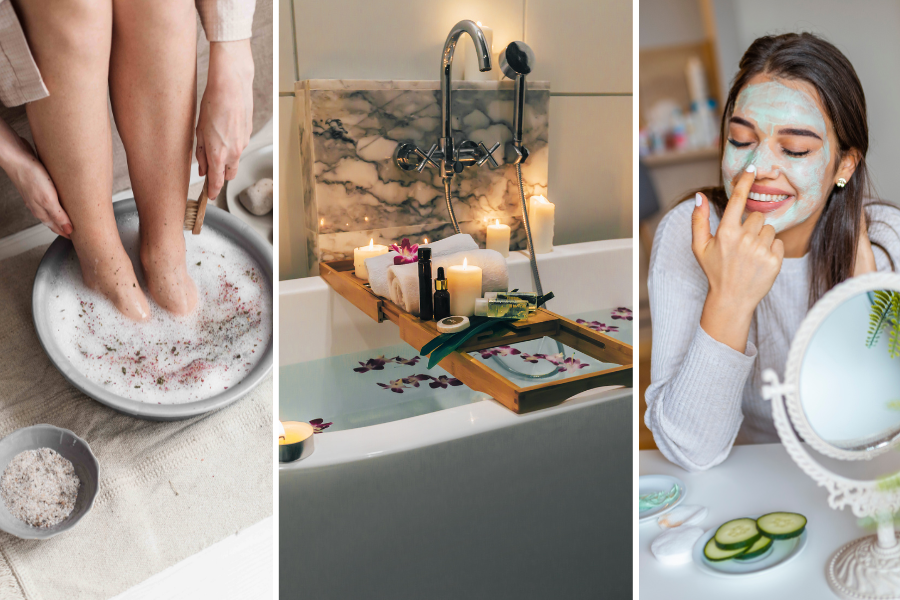In today’s fast-paced world, self-care has become more crucial than ever. Taking the time to care for your mind, body, and soul is essential for maintaining overall well-being and achieving a balanced life. Did you know that regular self-care practices can improve your mental health, boost your energy levels, and increase your productivity? This guide will provide you with the knowledge and tools to create a self-care routine that nurtures every aspect of your life. Ready to embark on a journey of self-love and well-being? Let’s dive into the ultimate guide to self-care!
Ultimate Guide to Self Care
Understanding Self-Care
Definition and Importance of this Ultimate Guide to Self Care
Self-care refers to the practices and activities individuals engage in to maintain and enhance their health and well-being. It involves taking intentional actions to care for one’s physical, emotional, mental, and spiritual needs. Self-care is crucial because it helps prevent burnout, reduces stress, and improves overall quality of life. Prioritizing self-care enables individuals to be more resilient, effective, and satisfied in both personal and professional aspects of life.
The Different Dimensions of Self-Care: Physical, Emotional, Mental, and Spiritual
- Physical Self-Care: Involves activities that promote physical health and well-being, such as exercise, nutrition, and sleep. It includes taking care of your body through regular physical activity, balanced eating, and proper rest.
- Emotional Self-Care: Focuses on understanding and processing emotions in a healthy way. It includes activities like journaling, therapy, and spending time with loved ones to nurture emotional well-being.
- Mental Self-Care: Involves engaging in activities that stimulate the mind and promote mental clarity, such as reading, puzzles, or learning new skills. It includes mindfulness practices and stress management techniques to maintain mental health.
- Spiritual Self-Care: Involves practices that nurture the spirit and provide a sense of connection and purpose, such as meditation, prayer, or spending time in nature. It focuses on exploring values and beliefs to find meaning in life.
Common Myths and Misconceptions About Self-Care
- Self-Care is Selfish: One of the most common misconceptions is that self-care is indulgent or selfish. In reality, taking care of oneself is essential for being able to care for others and fulfill responsibilities effectively.
- Self-Care is Expensive: Many people believe that self-care requires costly activities like spa treatments or luxury vacations. However, self-care can be simple and affordable, such as taking a walk, reading a book, or practicing meditation.
- Self-Care is Time-Consuming: While some self-care practices may take time, many effective activities can be integrated into daily life in just a few minutes, such as deep breathing exercises or quick stretches.
Physical Self-Care Practices
The Importance of Exercise for Physical and Mental Well-Being
Regular exercise is a vital component of physical self-care that benefits both the body and mind. It improves cardiovascular health, strengthens muscles, and boosts energy levels. Exercise also releases endorphins, which enhance mood and reduce symptoms of anxiety and depression. Incorporating physical activity into your routine can lead to better sleep, increased focus, and overall improved well-being.
Tips for Creating a Balanced Fitness Routine
- Mix It Up: Include a variety of exercises, such as cardio, strength training, and flexibility work, to target different areas of fitness and prevent boredom.
- Set Realistic Goals: Start with achievable goals and gradually increase intensity and duration as your fitness level improves.
- Schedule Workouts: Treat exercise as a non-negotiable appointment in your calendar to ensure consistency.
- Listen to Your Body: Pay attention to how your body feels and adjust your routine to avoid overtraining and injury.
Nutrition and Hydration for Optimal Health
- Balanced Diet: Focus on consuming a variety of nutrient-dense foods, including fruits, vegetables, lean proteins, and whole grains.
- Portion Control: Be mindful of portion sizes and avoid overeating by listening to hunger cues.
- Stay Hydrated: Drink plenty of water throughout the day to maintain energy levels and support bodily functions.
- Limit Processed Foods: Reduce intake of processed and sugary foods that can negatively impact health.
Emotional Self-Care Techniques
Understanding and Managing Your Emotions
Emotional self-care involves recognizing and understanding your emotions and finding healthy ways to express and manage them. Practicing emotional awareness helps prevent emotional burnout and promotes mental health. Techniques for managing emotions include practicing gratitude, seeking therapy, and engaging in creative activities that allow for self-expression.
Journaling Prompts for Emotional Clarity
- Daily Reflection: Write about how you feel each day and what might have triggered those emotions.
- Gratitude Journaling: List three things you are grateful for each day to focus on positive aspects of life.
- Exploring Challenges: Reflect on recent challenges and how you can learn from them.
- Emotional Check-In: Ask yourself, “What emotions am I experiencing right now, and what do I need to feel supported?”
Techniques for Building Emotional Resilience
- Mindfulness Meditation: Practice mindfulness to stay present and reduce stress.
- Positive Affirmations: Use affirmations to boost self-esteem and encourage a positive mindset.
- Stress Management: Identify stressors and develop coping strategies to manage them effectively.
- Social Support: Build a supportive network of friends and family who can provide emotional support.
Mental Self-Care Strategies
The Role of Mindfulness and Meditation in Mental Health
Mindfulness and meditation are powerful tools for improving mental health. They help increase focus, reduce stress, and enhance emotional regulation. Regular practice can lead to better self-awareness and mental clarity, making it easier to navigate challenges and maintain a positive outlook.
Simple Exercises to Improve Focus and Clarity
- Mindful Breathing: Spend a few minutes each day focusing on your breath to clear your mind.
- Visualization: Imagine a peaceful scene or successful outcome to calm the mind and enhance focus.
- Progressive Muscle Relaxation: Tense and relax each muscle group to release tension and improve concentration.
- Cognitive Exercises: Engage in activities like puzzles, reading, or brain games to stimulate the mind.
Techniques for Managing Stress and Anxiety
- Deep Breathing: Practice diaphragmatic breathing to activate the body’s relaxation response.
- Time Management: Prioritize tasks and break them into manageable steps to reduce overwhelm.
- Nature Walks: Spend time in nature to reduce stress and improve mood.
- Limit Screen Time: Take breaks from screens to reduce mental fatigue and improve focus.
Spiritual Self-Care Activities
Exploring Spirituality and Its Impact on Well-Being
Spiritual self-care involves exploring your beliefs and values to find meaning and purpose in life. It can provide a sense of connection, peace, and fulfillment. Engaging in spiritual practices, such as meditation, prayer, or nature walks, can enhance well-being and foster a deeper understanding of oneself.
Practices for Connecting with Your Inner Self
- Meditation: Spend time in quiet reflection to connect with your inner thoughts and feelings.
- Journaling: Write about your beliefs, values, and experiences to gain insights into your spiritual journey.
- Mindful Nature Walks: Spend time in nature to connect with the world around you and gain perspective.
- Creative Expression: Engage in artistic activities that allow you to express your spirituality.
Tips for Finding Purpose and Meaning in Life
- Explore Your Passions: Identify activities and pursuits that bring you joy and fulfillment.
- Volunteer: Give back to the community to create a sense of purpose and connection.
- Set Meaningful Goals: Align your goals with your values to create a sense of direction and purpose.
- Practice Gratitude: Focus on the positive aspects of life to cultivate a sense of meaning and appreciation.
Social Self-Care and Building Connections
The Importance of Social Connections for Overall Health
Strong social connections are essential for mental and emotional well-being. They provide support, reduce feelings of isolation, and improve overall quality of life. Building and maintaining healthy relationships with friends, family, and the community is a vital aspect of self-care.
Ways to Nurture Relationships with Family and Friends
- Regular Communication: Stay in touch through calls, texts, or visits to maintain connections.
- Quality Time: Plan activities that allow you to spend meaningful time together.
- Active Listening: Show empathy and understanding by fully listening to others.
- Express Gratitude: Let loved ones know how much you appreciate them and their support.
Setting Boundaries and Maintaining Healthy Social Interactions
- Know Your Limits: Understand your emotional and social boundaries to protect your well-being.
- Communicate Clearly: Express your needs and boundaries assertively but respectfully.
- Prioritize Relationships: Focus on nurturing relationships that bring positivity and support.
- Manage Social Media: Limit time on social media to reduce stress and foster genuine connections.
Ultimate Guide to Self Care for Busy Lifestyles
Tips for Incorporating Self-Care into a Busy Schedule
Balancing self-care with a busy lifestyle can be challenging, but it’s essential for maintaining health and well-being. Simple strategies like setting boundaries, prioritizing tasks, and delegating responsibilities can help create time for self-care.
- Schedule Self-Care: Treat self-care activities as important appointments in your calendar.
- Start Small: Incorporate short, manageable self-care practices into your daily routine.
- Be Mindful: Practice mindfulness during daily tasks, such as eating or commuting.
- Learn to Say No: Set boundaries to protect your time and energy.
Quick and Effective Self-Care Practices for Daily Life
- 5-Minute Meditation: Take a few minutes to practice deep breathing and relaxation.
- Stretching Breaks: Incorporate quick stretches into your day to relieve tension.
- Hydration: Keep a water bottle with you to stay hydrated throughout the day.
- Digital Detox: Take short breaks from screens to recharge and refocus.
Creating a Self-Care Routine That Fits Your Lifestyle
- Assess Your Needs: Identify areas of your life that require more attention and care.
- Create a Plan: Develop a self-care plan that includes activities you enjoy and find meaningful.
- Be Flexible: Adapt your routine as needed to accommodate changes in your schedule.
- Reflect and Adjust: Regularly assess your self-care practices and make adjustments to ensure they meet your needs.
Creating a Personalized Self-Care Plan
How to Assess Your Self-Care Needs and Priorities
Assessing your self-care needs involves evaluating your physical, emotional, mental, and spiritual well-being. Identify areas that require more attention and focus on creating a balanced approach to self-care.
- Self-Reflection: Spend time reflecting on your current self-care practices and identify areas for improvement.
- Identify Priorities: Determine which areas of self-care are most important to you and focus on those first.
- Seek Feedback: Ask friends or family for input on areas where you may need additional support.
- Set Realistic Goals: Create achievable self-care goals that align with your lifestyle and priorities.
Steps for Developing a Self-Care Plan Tailored to Your Needs
- Define Your Goals: Set clear and realistic self-care goals that align with your values and needs.
- Choose Activities: Select self-care activities that you enjoy and find meaningful.
- Create a Schedule: Plan when and how you will incorporate self-care into your routine.
- Monitor Progress: Track your progress and adjust your plan as needed to ensure it remains effective.
Tips for Maintaining Consistency and Adjusting Your Plan as Needed
- Stay Flexible: Be open to adjusting your self-care plan as your needs and circumstances change.
- Celebrate Successes: Acknowledge and celebrate your achievements to stay motivated.
- Reassess Regularly: Regularly evaluate your self-care plan to ensure it continues to meet your needs.
- Seek Support: Enlist the help of friends or a coach to stay accountable and motivated.
Self-Care for Different Life Stages
Adapting Self-Care Practices for Young Adults, Parents, and Seniors
Self-care needs vary across different life stages. Young adults may focus on career development and social connections, while parents may prioritize family responsibilities and self-care. Seniors may focus on maintaining physical health and mental agility.
- Young Adults: Focus on building healthy habits, managing stress, and nurturing relationships.
- Parents: Prioritize self-care to maintain energy and resilience for parenting responsibilities.
- Seniors: Focus on maintaining physical health, mental sharpness, and social connections.
Addressing Specific Challenges and Needs at Each Life Stage
- Young Adults: Manage career stress, social pressures, and financial challenges.
- Parents: Balance work and family responsibilities, and find time for self-care.
- Seniors: Address health concerns, maintain independence, and stay socially connected.
Resources and Support for Self-Care at Every Age
- Young Adults: Access online courses, social groups, and career coaching.
- Parents: Join parenting groups, access childcare support, and seek counseling.
- Seniors: Participate in senior fitness programs, community centers, and support groups.
Overcoming Common Self-Care Challenges
Dealing with Guilt and Misconceptions About Self-Care
Many people experience guilt or misconceptions about prioritizing self-care. Recognize that self-care is essential for overall well-being and not a selfish act.
- Acknowledge Guilt: Recognize feelings of guilt and remind yourself that self-care is essential for health and well-being.
- Educate Yourself: Learn about the importance of self-care and its positive impact on health.
- Challenge Misconceptions: Address common misconceptions by understanding the true purpose of self-care.
Strategies for Overcoming Barriers to Self-Care
- Identify Barriers: Recognize obstacles that prevent you from practicing self-care.
- Set Boundaries: Establish limits to protect your time and energy.
- Seek Support: Ask for help from friends, family, or professionals to overcome challenges.
- Prioritize Self-Care: Make self-care a priority in your schedule and stick to it.
How to Stay Motivated and Committed to Your Self-Care Routine
- Set Clear Goals: Define specific self-care goals and track your progress.
- Stay Flexible: Adapt your routine as needed to accommodate changes in your life.
- Find Enjoyment: Choose activities you enjoy to maintain motivation and commitment.
- Reflect and Adjust: Regularly evaluate your self-care routine and make adjustments to ensure it remains effective.
By understanding and implementing this Ultimate Guide to Self Care practices, you can create a balanced and fulfilling routine that supports your overall health and well-being. Tailoring your self-care routine to your needs and life stage will ensure it remains relevant and effective, helping you to thrive in all areas of your life.
Ultimate Guide to Self Care Wrap Up:
Embracing self-care is a powerful step toward living a healthier, more fulfilling life. By prioritizing your physical, emotional, mental, and spiritual well-being, you can achieve a greater sense of balance and joy. Remember, self-care is not a luxury—it’s a necessity. Start today by incorporating these practices into your routine and watch how they transform your life. Ready to make self-care a priority? Follow this guide and create a self-care routine that nourishes your mind, body, and soul every day!
This post was an Ultimate Guide to Self Care.
Other Posts You Might Like:





